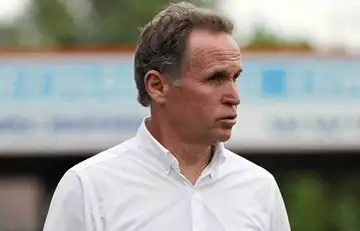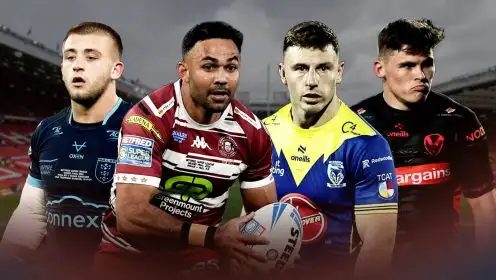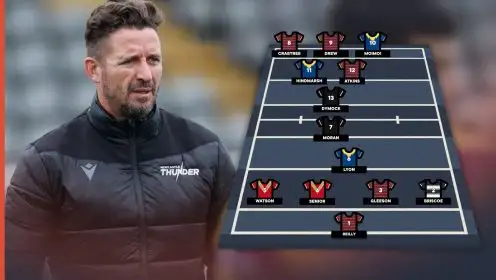Five Things: Deadline drama, stability and Rhinos raid

John Davidson breaks down the past week in Super League, which saw Hull FC handed a lesson and a flurry of transfer activity.
1. Deadline drama
It was a period of player moves and frenzied transfers like rugby league has hardly seen before. Loans between Super League clubs, swaps with Super League and Championship sides, the arrival of NRL stars, wheeling and dealing galore. It was all happening as teams looked to strengthen and beef up before the start of the Super 8s. It gave the media plenty to write about and the fans lots to talk about, and was more grist to the mill.
Football has long has its deadline day as its transfer window winds down, but with 92 football clubs in England and hundreds more overseas, the amount of potential player movement in that sport is mind-boggling. Rugby league doesn’t have the same volume of transfers but still it made for fun watching as squads were heavily shaken up. It seems to be an unintentional result of the new competition revamp, but it might become a regular part of the calendar. Wakefield coach Brian Smith certainly believes it’s here to stay and won’t be a one-off.
“I think it’s just the nature of it, it’s almost like the deadline in soccer now,” Smith said. “I think every year at this time now is going to be like this where teams are trying to fill up whatever they can, any spots that may be weak or need strengthening. Everybody’s going to do this every year I think.”
2. Stability equals success
While squad changes might be common in football, rugby league is a different kettle of fish where stability is much more important. Players need to know defensive structures, attacking plays and how to combine with their teammates. They need to gel so that they can have faith in their man next to put their body on their line and do their job in defence. You can’t just throw a new hooker or halfback in and expect things to run smoothly. So keeping the same squad together and intact over several years, building a good culture, making small changes not big ones, is the way to go. You see the most successful sides over time in rugby league employ this model, from Leeds, St Helens and Wigan in Super League, and from Melbourne and Manly in the past decade in the NRL.
Turnover of half of your squad, or more, is always going to make things difficult. So it has been interesting to see the huge changes that Wakefield have made, with 10 new players coming in over the past few months. Salford have also made big changes to their roster each year for the past two years, and that has continued during this season. Hull KR went through a mass overhaul at the end of the 2014 campaign and have struggled for consistency this term. You contrast that with the approach of Leigh who have made minimal signings over the past few years. Apart from the additions of some experienced figures like Micky Higham, Gareth Hock and Fui Fui Moi Moi – all internationals – the Centurions squad has been stable. This has allowed them to build, for Paul Rowley to develop a playing style and drill it into his charges over time. The benefits are plain to see with the confident, brave style of footy they dish up.
Panic buying has been all the rage in the past week but will it ultimately save several clubs from relegation? It will be fun to find out. I think Wakefield and Salford could be in for a tough few weeks, especially against the might of a resurgent Bradford and a confident Leigh. The Middle 8s might be more entertaining than Super League’s version.
3. Rhinos charging
Leeds have claimed top spot after defeating Catalans 36-22. The Rhinos finished a point higher than St Helens and with 16 wins, six losses and one draw. Saints deserve praise being just a point behind after suffering injury after injury and several big-name player retirements. But the Yorkshire side are worthy winners as Brian McDermott’s men played a lovely brand of rugby league to watch, with plenty of verve, pace, power and ball movement. So far it has been a fitting end for two legends of the game, Kevin Sinfield and Jamie Peacock, who are both hanging up their boots at the end of this season.
With a Challenge Cup semi-final ahead and a great starting spot for the Super 8s, Leeds are in the box seat for trips to both Wembley and Old Trafford. The seemless way the Rhinos have brought in their new blood, players such as Brad Singleton, Liam Sutcliffe and Robbie Ward, and blended them in has been impressive. Leeds are a team with few weaknesses and so many strike weapons, the offloading machine that is Adam Cuthbertson to name just one. The Rhinos’ planning for the post-Sinfield, Peacock and Kylie Leuluai era, has been spot on. Along with arrival of Wests Tigers prop Keith Galloway next year, who will add some experience to the front row, the future appears bright at Headingley.
4. Airlie Bird-flu
Hull FC look well and truly cooked this season, if their one-sided defeat at the hands of Wigan on Thursday is anything to go by. Without key members Gareth Ellis and Leon Pryce for the rest of 2015, they struggled to contain a rampant Warriors outfit. The Black and Whites defence, which has been a highlight for most of the year, was poor and their attack was impotent. Basic errors have crept into their game in the past few weeks and they now severely lack on-field leadership.
Hull FC and Catalans, in seventh and eighth position, will be just making up the numbers in the semi-finals. I can’t see either winning four of the next seven games, with just three at home, against top-quality opposition. Hull FC have not beaten Leeds or Wigan all year, and have only managed one win each against Warrington, St Helens, Castleford, Huddersfield and Catalans. The Airlie Birds have recruited strongly for 2016 though, with Frank Pritchard to be joined at the KC Stadium by Scott Taylor and Carlos Tuimavave. Other signings, rumoured to include Krisnan Inu, Tony Williams and Daniel Vidot, would certainly add some class. Hull FC need to regroup and already look ahead to next year. As Paul Clarke wrote in The Hull Daily Mail, Lee Radford needs to see if youngsters such as Jansin Turgut, Reece Dean and Brad Fash are ready for Super League. And there’s no time like now to find out.
5. Braveheart Benji
Causing a ripple in the rugby league world was the news that former New Zealand captain Benji Marshall had put out some feelers about playing for Scotland. Apparently eligible through a Scottish grandparent, Marshall met Scotland coach Steve McCormack when he was out in Australia. But when the story broke in both hemispheres Marshall backpeddled quickly, stating it was “bullshit”. The star five-eighth was quoted as saying: “This stuff makes me look bad and I am pretty angry about it.” What is funny is that Scotland Rugby League has confirmed the contact and Marshall was indeed interested in joining the Bravehearts.
It does make the red-faced Marshall look bad because he has little hope of representing the Kiwis in the future, despite his claims that he is in line for the end of season England tour. While the playmaker does have a great history in the black shirt with 27 caps, a World Cup win and a Four Nations title under his belt, he hasn’t played for New Zealand since 2012 and isn’t likely to again. Shaun Johnson and Kieran Foran have thrived as the Kiwis two halves, leading them to three straight victories over Australia, and they will be the national partnership for years and years to come. Both are young, world-class talents. Yes, Johnson’s injury has thrown up a potential lifeline for Marshall, but considering his NRL form in 2015, that’s still a long shot. Thirty-year old Benji has hardly set the NRL alight since returning from rugby union.
The whole episode also makes international rugby league look bad. Should a former Kiwi skipper, with eight years of playing for his country, be allowed to swap nations? The grandparent rule, along with the residency, needs to be looked at. The fact that players can change countries so easily makes a mockery of international footy. We need stricter eligibility to give the international game some more credibility and integrity. You only have to peek at the case of Parramatta forward Joseph Paulo who was born in New Zealand, grew up in Australia and has played four Tests for Samoa and captained the United States in the 2013 World Cup. He played for the Australian Schoolboys as a youngster, the same as Marshall, and has also represented NSW at City-Country level. Paulo might be a special case but eligibility is certainly an area for the Rugby League International Federation to examine and improve.
Follow John Davidson at Twitter @johnnyddavidson



